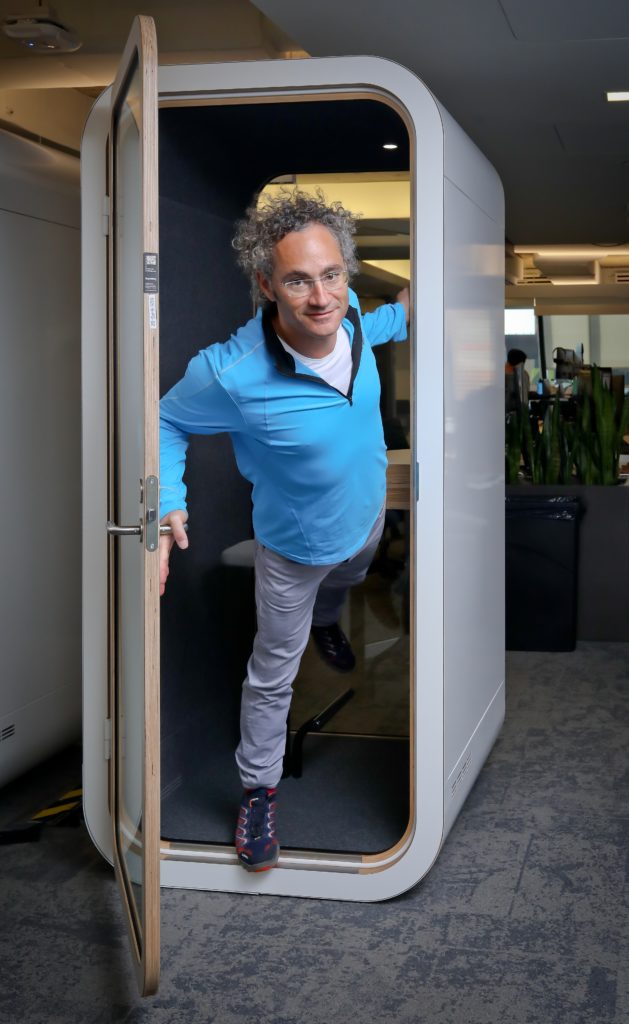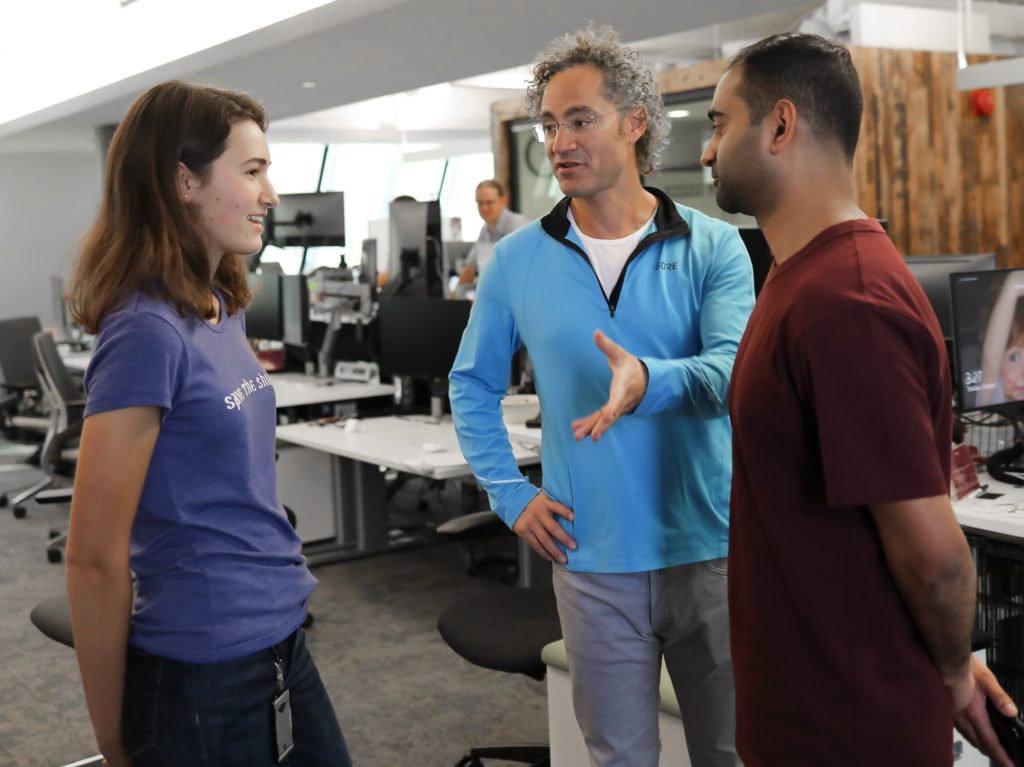High Tech Georgetown: Palantir
By • October 9, 2019 0 17264

The first thing you see at the entrance of Palantir Technologies on Thomas Jefferson Street in Georgetown is an American flag flanking a life-sized Chewbacca, the hirsute hero of “Star Wars.”
This image summarizes what inspires Palantir and the people who work here: a sense of mission and a sense of fun.
Since moving to Georgetown from Northern Virginia in 2015, the uber-powerful data enterprise software firm has stayed mainly under the radar — but isn’t shy about loving its adopted neighborhood.
With some 2,500 employees spread across the globe, Palantir is based in Silicon Valley, where it’s known as a top-tier “unicorn,” valued at as much as $40 billion by some estimates. The Palantir IPO is hotly anticipated by market observers, and the company’s every move (including its new contract) is scrutinized and, in some quarters, protested.
Its client list includes a roster of international household names like Airbus and Merck, but its large government contracts, particularly with intelligence agencies, the Pentagon and the Department of Homeland Security, are what give Palantir its sheen of intrigue — and its predilection for controversy.
Earlier this year, Palantir beat out several competitors for an $800-million contract with the U.S. Army.
Its software is known as a “killer app” for its ability to track behavior — stealthily monitoring criminals and terrorists, as it did in 2011, when it reportedly helped bring Osama bin Laden to his demise.
This software is also tracing foodborne allergens, reducing health care costs and homelessness and busting child pornographers and sex traffickers.
The company’s tagline is “Save the Shire,” which is emblazoned on its T-shirts, and on my visitor’s badge. This reference is inspired by J.R.R. Tolkien’s “Lord of the Rings,” the shire being home to the hobbits, the heroes of the stories.
The company’s name — Palantir — is a sort of crystal ball or “seeing stone” in Tolkien’s mythology, a means to observe faraway events.
We got a rare look inside Palantir’s Georgetown office, where we met an interesting cast of characters (or “Palantirians”), including Jason Richardson, a reliability lead whose three basset hounds — Maizy, Buck and Parcey — are never far behind.
Palantirian average age is early 30-something, average IQ is well, well above average and average wardrobe is engineer chic — jeans and zip-up sweatshirts are the norm, even for CEO Alex Karp.
Karp is the Han Solo of Palantir — part rebel, part leader, with an iconoclastic style one commentator aptly described as “hipster mad scientist.” Besides Karp, Palantir’s co-founders are Peter Thiel, Nathan Gettings, Joe Lonsdale and Stephen Cohen.
According to Karp, Palantir’s move to Georgetown was motivated in part by the company’s ability and desire to recruit young talent, the kind of workers who enjoy being closer to urban life and to the amenities Georgetown has to offer.
Shannon Clark and Mary Walker take advantage of the pro-sneaker policy to walk to work every day through the parks of Georgetown. Clark brings her spaniel, Penny Lane, to hang with canine colleagues like Sybil, the mixed-breed of Lauren Schor, who works in Clark’s department. They idle in massive dog beds that can double as beanbags for more relaxed humans.
Palantir’s D.C. nest, like the company’s others, bursts with Silicon Valley perks: a masseuse, a meditation room, a barber shop, a dry cleaner and a speakeasy room that hosts regular beer tastings. Soundproof pods stand in the middle of the open floor plan like phone booths from outer space.
A pool table and a superfluity of candy jars lend levity to the high-tech, high-stakes workspace. Baked & Wired cupcakes, a favorite with Karp, round out the three catered meals served in a cafeteria-style dining area.
The dogs, too, get plenty of treats while they are lounging in the conference rooms, all named for national parks. Other rooms honor Founding Fathers.
This is a company that takes its connection to serving the country, and its military, very seriously, employing more than 100 veterans.
At one time, Silicon Valley was supportive of U.S. government and defense, but now, according to Karp, Silicon Valley is “telling the average American, ‘I will not support your defense needs,’ and then selling their products to countries that are adversarial to America,” as he told CNBC earlier this year.
“We’re happy to be one of the only pro-American companies in Silicon Valley, and we wonder why the others struggle to explain why they don’t support our troops, while we have no struggle explaining why we do,” he told us.
“Internally, we have a lot of discourse about it,” says Richardson, meaning controversy. This summer, Palantir stared down an internal division when employees signed a letter asking Karp to reconsider another contract with U.S. Immigration and Customs Enforcement.
Nevertheless, the ICE contract was renewed, prompting protest groups to stage demonstrations outside Palantir offices in Palo Alto, in New York and even on Karp’s front porch.
Karp told us he defends the protesters right to do so, just as the military personnel he supports defend our country, adding that he’d be open to meeting with the protesters if they could be fair and reasonable.
“We’re incredibly motivated by the work we do,” says Walker. “We don’t ignore the criticism of those stories, but we don’t let it impact the good work we’re doing.”

Alex Karp, CEO of Palantir Technologies. Photo by Tony Powell.

Alex Karp, CEO of Palantir Technologies, speaks with co-workers at the Georgetown office. Photo by Tony Powell.

The American flag and Chewbacca at the entrance of the Palantir Georgetown office. Photo by Stephanie Green.

